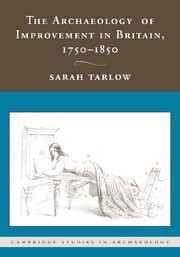SEVEN - FINAL THOUGHTS
Published online by Cambridge University Press: 23 July 2009
Summary
It does not seem appropriate to call this chapter ‘Conclusions’ because this exploration of the idea and implications of ‘Improvement’ between 1750 and 1850 has led less to a set of closely defined rules and regularities and more to a web of ambiguities and further questions. Duke and Saitta (1998) advocate an archaeology which is, among other things, ‘less concerned with achieving hegemony for a particular theoretical position (or some new, eclectic synthesis of “the best” of existing paradigms) than with “keeping the conversation going” among the diverse sets of clients and constituencies served by archaeology’. Since this book has certainly not achieved hegemony for a new metanarrative (to replace archaeologies of capitalism, colonialism or industrial technology, for example), nor has it set out to do so, if it keeps the conversation going, that would certainly be a good way to finish.
POINTS AND CONSIDERATIONS
A few general points are worth recapping, and a few particular questions worth posing; the points (which I will consider in turn below) are:
Improvement is a distinctively modern ethic that informs many fields of practice and discourse.
Improvement is ideological rather than purely a rational response to economic circumstances.
Espousal of an ethic of Improvement had social and political advantages. Nevertheless, attempts to effect improvements are not always reducible to the pursuit of personal social or economic advantage. Values, aspirations and beliefs are more complicated than that.
Belief in Improvement had a complicated relationship to class and geographical identities; in contrast to earlier periods, it is the homogeneity, rather than the local variability, of material improvements which is most remarkable at this time.
[…]
- Type
- Chapter
- Information
- The Archaeology of Improvement in Britain, 1750–1850 , pp. 190 - 201Publisher: Cambridge University PressPrint publication year: 2007



